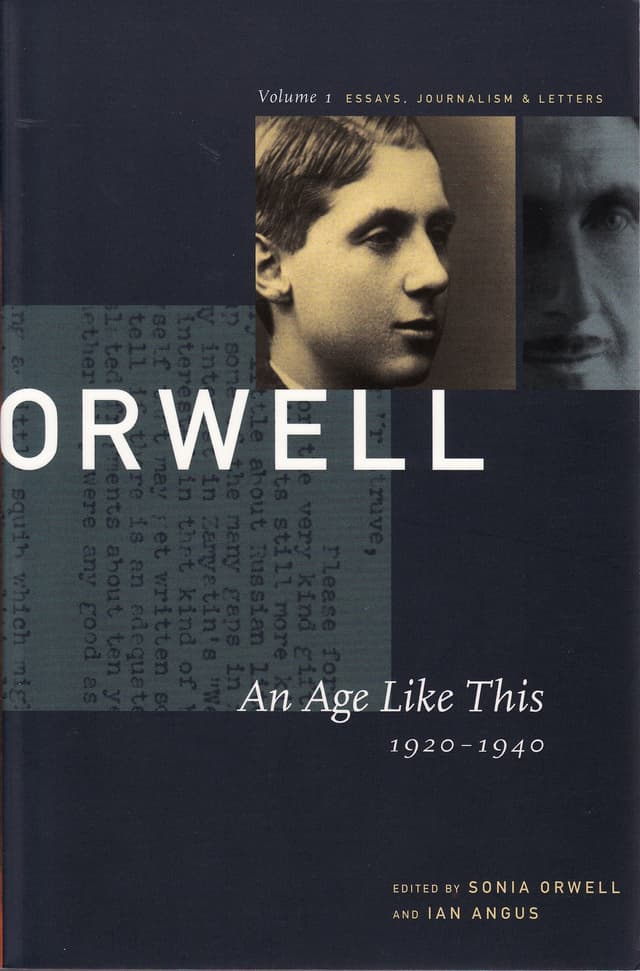
Book Review Summary: An Age Like This: 1920-1940 (The Collected Essays, Journalism & Letters, Vol. 1)
Introduction
"An Age Like This: 1920-1940 (The Collected Essays, Journalism & Letters, Vol. 1)" by George Orwell is a comprehensive collection of the author's nonfiction writing during the early years of his career. This volume showcases Orwell's keen intelligence, wit, and ability to capture the essence of social injustice and totalitarianism. With a mix of essays, letters, and journalism, this book provides a literary self-portrait of a writer deeply engaged with the world around him. In this article, we will delve into the book's content, analyze readers' views, and explore the reasons why this collection stands out among Orwell's works.
About George Orwell
George Orwell, born Eric Arthur Blair, was an English author and journalist known for his powerful writing style and thought-provoking works. His books, such as "Down and Out in Paris and London," "Nineteen Eighty-Four," and "Animal Farm," have left an indelible mark on the literary world. Orwell's writing is characterized by its clarity, passion for democratic socialism, and opposition to totalitarianism. In addition to his literary career, he served as a police officer in Burma and fought in the Spanish Civil War. Orwell's influence on contemporary culture continues to be felt decades after his death.
Analysis of Views
-
Engaging Narrative: Readers praise the book for its engaging narrative structure, which combines essays with personal letters to create a cohesive story. The early years of Orwell's life, spent tramping, hop-picking, and reporting on the working class in England, provide a unique perspective on the time period.
-
Honest Portrayal: Orwell's writing is commended for its honest portrayal of his subjects. He never romanticizes his subjects but presents them as they are, highlighting their ambiguities while still advocating for their better treatment. This approach resonates with readers who appreciate authenticity in literature.
-
Spanish Civil War: The section on the Spanish Civil War receives particular acclaim. Orwell delves into the complexities of the conflict, focusing on the infighting within the left-wing movement rather than the binary struggle between right and left. His insights into the political landscape offer valuable context for understanding contemporary politics.
-
War and Personal Change: Readers appreciate how Orwell's views on war evolve throughout the book. Initially anti-war, he eventually supports his own country during World War II due to a combination of factors, including his military upbringing, love for authors like Kipling, and belief in socialist revolution. This transformation adds depth to his characterization and provides food for thought about the nature of conflict.
-
Positive Outlook: Despite the bleak circumstances he writes about, Orwell's non-fiction writing leaves readers feeling positive. He values life itself and the process of living, recognizing that politics is only a means to improve it. His appreciation for common decency and his belief in the power of literature shines through in his writing.
Reasons for Recommendation
-
Literary Mastery: Orwell's mastery of language and craftsmanship is evident in this collection. His ability to convey complex ideas with clarity and precision makes it a must-read for lovers of literature.
-
Insightful Social Commentary: The book offers valuable insights into society during the early 20th century. Orwell's observations on poverty, social injustice, and political movements provide a window into a bygone era while remaining relevant to contemporary issues.
-
Engaging Narrative Structure: The combination of essays and personal letters creates a compelling narrative that keeps readers engaged from start to finish. The book's structure allows readers to follow Orwell's journey as a writer and gain a deeper understanding of his thought process.
Reasons for Not Recommendation
-
Limited Focus on Fiction: While this volume contains some essays that later appeared in Orwell's novels, it primarily focuses on nonfiction writing. Fans of his fiction works may find this collection less satisfying as they are primarily interested in his fictional works.
-
Lack of Chronological Order: The book does not follow a strict chronological order, which may confuse some readers who prefer a linear narrative structure. However, this lack of chronology is intentional, as it allows readers to explore different periods of Orwell's life and writings at their own pace.
Conclusion
"An Age Like This: 1920-1940 (The Collected Essays, Journalism & Letters, Vol. 1)" by George Orwell is a must-read collection that showcases the literary genius of one of the 20th century's most influential writers. Through essays, letters, and journalism, Orwell provides a unique perspective on society during the early years of his career, exploring themes such as poverty, social injustice, and political movements. His honest portrayal of his subjects and evolving views on war make this book a thought-provoking read that leaves readers feeling positive about life itself and the power of literature to improve it. While some readers may prefer his fiction works or find the lack of chronological order confusing, this collection is highly recommended for those interested in Orwell's nonfiction writing and seeking insights into his early years as a writer.